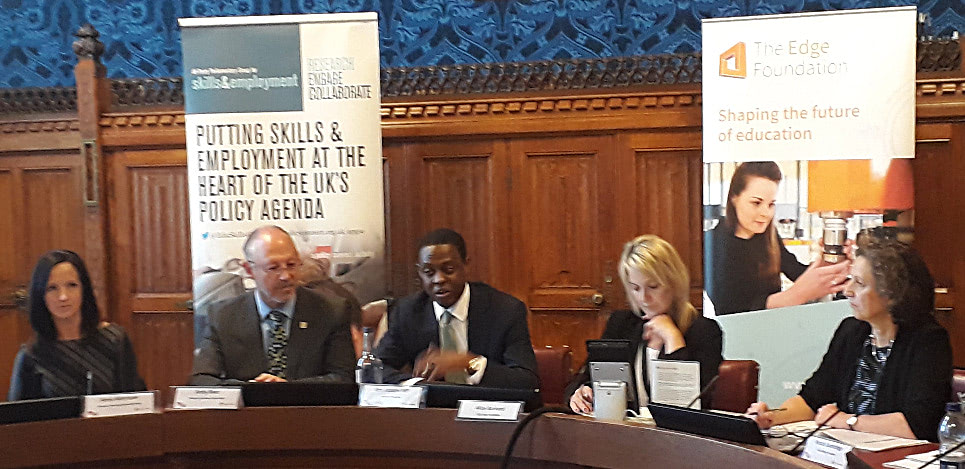‘False dichotomy’ between academic and vocational education condemned

At a high level roundtable of the All-Party Parliamentary Group for Skills and Employment, held in the Palace of Westminster and chaired by Bim Afolami MP, MPs and senior figures from the education sector and business, set out the case for employment focused higher education (HE).
New Office for Students (OfS) Chief Executive, Nicola Dandridge, outlines plans to diversify the higher education system, making some of her first public statements on the subject. She described how the new OfS sees its role in this and condemned the “false dichotomy” between vocational and academic education and explained that part of the role of the new regulator is to correct this misconception.
The OfS is in its second month of operation as the new principle regulator for HE institutions in England.
Speakers included:
- Bim Afoloami MP
- Nicola Dandridge – Chief Executive, Office for Students
- Alice Barnard – Chief Executive, Edge Foundation
- Andrew Boer – Principle, Edge Hotel School
- Anna Morrison – Director, Amazing Apprenticeships
The conversation focused on the need for greater understanding of vocational provision and better engagement with employers. The discussion mirrored the ongoing debate around T levels and the separation of vocational and academic education throughout the system which critics contend can potentially leading to poorer outcomes for students.
The event was organised in response to two reports published 2017. The Edge Foundation’s Our Plan for Higher Education, presented clear evidence that the decline in the value of the graduate premium has led over a third (35%) of young people who had graduated since 2010, to feel their degree had been poor value for money. It also highlighted that many employers believe graduates are ill-equipped with workplace skills. The declining graduate premium and rising skills shortages challenge our current model of tertiary education – 40% of graduates are in work that does not require a degree.
The HE Commission’s report demonstrated the need for diversity within HE provision to drive social mobility and widen participation. The new OfS has a statutory duty to secure value for money and to address employer’s needs.
Bim Afolami MP, roundtable Chair and Conservative Member of Parliament for Hitchen and Harpende:
“When politicians are sceptical about apprenticeships they should examine their own career pathway. Politicians are expected to have been involved in party activism and possibly been a local councillor and run in an unwinnable seat, developing a practical understanding of the political system.”
“Developing a skill that is both useful to the individual and to society involves learning from different experiences. That is why the nature of this discussion is important in casting light on the different types of non-traditional employment focused higher education provision.”
 Nicola Dandridge, CEO, the Office for Students:
Nicola Dandridge, CEO, the Office for Students:
“Degree Apprenticeships are proving incredibly popular with both students and employers. The OfS has a statutory duty to secure value for money for students and the taxpayer and it’s important that we correct the misconception that HE is not about vocational education.”
 Alice Barnard, CEO, Edge Foundation:
Alice Barnard, CEO, Edge Foundation:
“Two in five graduates are doing jobs that do not require a degree according to research by the Edge Foundation in 2015. There is a moral problem with students acquiring massive debt with a declining graduate premium.”
About Policy Connect: A cross-party think tank, delivering new policy ideas through research, evidence, political meetings and sector engagement. A non-profit social enterprise, Policy Connect aims to improve people’s lives by changing policy. It recommends the best approach from facts, data and consensus. The All-Party Parliamentary Group for Skills and Employment is administered by Policy Connect.











Responses